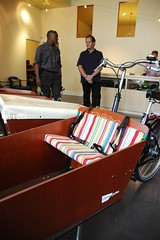The mountain of bad economic news in this country seems to get steeper with each passing day. But amid the slowdown, there are some signs that bike-related industries are still rolling along with ease, at least for now.
Signs from the local, national and global bike industry indicators are mixed. In this story, we take a look at some of those signs and ask several industry players how things are going.
Bike Europe, a trade magazine that covers the bike business on the other side of the pond, reported last week on Taiwan’s export numbers. Overall, their exports are down 5.5 percent over last year, but bicycles are one of only two “industry sectors” that are up (the other is pharmaceuticals).
Bike Europe has also recently reported that Trek Bicycles CEO John Burke told a crowd at a Taiwanese supplier’s summit that Trek’s business is up over 7 percent and his outlook for the future is rosy. Trek recently got a lot of publicity for their belt-driving “District” urban bikes and they’re well-positioned to capitalize on the growing commuter/urban/utility market.
< ?php if (function_exists('dfrad')) { echo dfrad('ad_225x225'); } ?>
I asked Mr. Burke if the bike business can weather the economic storm and what his thoughts are on the symbolism of the failing U.S. auto industry. “In these difficult and historic economic times there are winners and losers,” he wrote via email, “there are more losers than winners, but….there are winners.”
“Cities that have been proactive in their bike policies will see the biggest gains.”
— BikeBiz editor Carlton Reid
Burke added that “SUV’s are losers, small cars are winners,” and he repeated his stump speech for bikes; that they’re a “a simple solution to very complicated problems,” like our health issues, the environment, congestion, and so on.
UK-based editor of Bike Biz, and an author of the forthcoming Bike to Work Book, Carlton Reid adds a cautionary note to the good news.
He says that sales were stellar in August, September and October, but then they “fell off a cliff in November” in both the US and the UK. He said he’s also seen an “alarming drop in bike imports” into the UK from key supplier countries.
Reid says many of the industries major players have reported big gains in the first three quarters of 2008, but that he expects softer fourth quarter sales.
As for Spring, Reid foresees a big bounce coming from March onwards. He adds that because of the growth in the commuting/urban bike market, “Cities that have been proactive in their bike policies will see the biggest gains.”
Like many in the industry, Reid thinks cargo and commuting bikes are set to “really expand in 2009”.
On a more local level, there seems to be a feeling that Portland is well-positioned to capitalize on the market for bikes if/when the economy gets worse.
Martina Fahrner is a co-owner of Clever Cycles. She says “everything is good” and that they’re still making rent and payroll. The shop did see a slowdown in foot traffic when Wall Street first started tanking back in October, but Fahrner says so far in the holiday shopping season, “it doesn’t seem like it’s much quieter than last year around this time.”
Fahrner thinks if people begin to cut back more, many of them will buy bikes. She wants to turn a worsening economy into a positive thing for local shops. “Just getting rid of one car can help you save money,” she said, “I think that we will start to see more bike sales.”
Fahrner has put on a workshop on how to finance health insurance by cutting back on cars, and is thinking of doing more community outreach to educate Portlanders about how to save money by cutting car use.
The owner of Portland-area online retailer TeamEstrogen.com says she’s noticed an “obvious change in buying habits” of late. Susan Otcenas — who’s also a BTA board member — told us her year-to-date sales are flat and that her sales were down in October (sales “fell of a cliff” is how she put it) and November.
Otcenas says December sales are looking much better than the last two months and added that, “Consumers are very price conscious right now.” TeamEstrogen.com is running more sales and promotions to counter that trend, which is something Otcenas says she “would rather not have to do” but is stuck because her inventory was ordered back in Spring when the economy was “totally different.”
Jay Graves is the owner of Bike Gallery, which has six locations throughout the Portland region. He is also a former president of the National Bicycle Dealers Association and travels often to other parts of the country to speak and hear from retailers.
Graves echoes comments made by Carlton Reid that the health of the bike business might be tied to areas that have a developed bike infrastructure. “Some retailers in the US are very challenged right now,” he wrote via email. “Our market (in Portland) might be doing well but there are many bike retailers around the country that don’t share our optimism.”
Last April, local bike shops were reveling as gas approached $4 a gallon. Now, prices have dipped below $2 and, while most people realize they will shoot back up again, the impact on bike ridership is real.
Susan Otcenas of TeamEstrogen.com says she wants to believe things will improve in the upcoming season, but that “If gas prices stay this low then I can’t be too optimistic for bike business booming.”
Elly Blue contributed research to this story.
Stay tuned for more coverage of how the recession might impact Portland’s bike economy. Next up we’ll check in with some of Portland’s local framebuilders.



